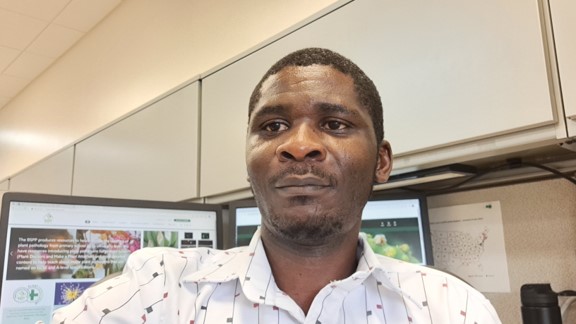John Oladokun is presently a Postdoctoral Extension Associate in the Department of Plant Pathology & Microbiology, Texas A & M University.
He is working on diagnosis of plant viruses at the Texas A & M AgriLife Research & Extension center, Weslaco, USA.

John received funding to attend the CONNECTED Africa launch conference and early career researcher training in Uganda, in 2018. He had also benefited from three weeks intensive training at Fera Science Limited, UK, in October 2019 and another four weeks training on the use of HTS technology in plant virus diagnosis in October 2021 at Texas A & M AgriLife Research & Extension center, USA respectively – having successfully applied for CONNECTED Training Vouchers.
In addition, John attended several sessions during the network’s 2020 ‘Springboard To Impact’ conference, small-group CONNECTED communications coaching as well as other past activities/events organised by the network.
Looking back on the lab training visits, John says he valued getting access and practical experience of plant pathogen detection and diagnostic tools: “The frequent one-to-one brainstorming sessions with my hosts on data analysis and interpretation, effective scientific reporting skills, and how to handle administrative works in a team were all invaluable to me,” he says.
Collaborations
“My UK and US hosts also ensured I met a number of new people both within and outside my own specific fields of interest, which will be helpful when it comes to future research collaborations,” he says.
In fact, it’s clear that the value of a range of new collaborations and contacts acquired as a result of John’s involvement with CONNECTED is something he values hugely.
“I have been able to expand my professional network which led, for example, to my current employment with the Texas A & M University, collaboration in research projects, joint article publication” John continues. “I’ve also had easy access to, and regular exchanges of ideas with world-class professionals in a peer-review process of a personal and group manuscripts as well as research proposal for external funding. I’ve valued the way these relationships have grown, to such an extent some have become referees for future job searches.”
As a result of his collaboration with other network members John took joint responsibility for leading an online bioinformatics class and is looking to organise similar events in future.
Using new skills to good effect
Reflecting on the ECR training workshop he attended in 2018, John believes this made a tangible difference to his career, citing two successful applications that he attributes to the application-writing skills he acquired: success applying for a CONNECTED Training Voucher for the UK and US lab visits, and a two-year sponsored membership of the American Phytopathological Society (APS) Office of International Programs.
Understanding the value of offering support to others, John says he has also assisted lab colleagues with their proposals for external and internal funding opportunities. “I also do consultation willingly, happily, and freely for farmers and research students who require help,” he adds.
“Following my return from the UK and US I have been helping postgraduate students within and outside my department solving problems they face in using diagnostic tools – which my institution now has in its possession.”
Professional development
John is rightly proud of the changes his involvement with the network have brought about in his working practices: “Many things have changed, to be honest,” he says. “To do away with pride and self-praise, I could see a clear distinction in the ways I did things before and now, among peers, and how I have been handling activities relating to my present workplace. I am still moving towards being fully professional in the field I have chosen, yet, I can smell it around me already. Again, this is thanks to those opportunities provided by the CONNECTED Network,” he confides.
And when asked about new roles and responsibilities he has taken on as a result of his network involvement, John continues: “Through the training received in the UK, most importantly on interpretation and effective scientific reporting skills which have broadened my horizon, I now add to my responsibilities serving in the following groups:
- Member, student and postdoctoral representative, APS- African division
- Member, APS detection and diagnostic committee
- Member, APS plant virology committee
- Member, APS Extension committee
- Reviewer, APS, Plant Disease Journal
- Reviewer, Indian Phytopathological Journal
- Reviewer, Journal of Integrative Agriculture
When asked to sum up the impact of his involvement with the network, John says: “To my professional development, my involvement in the CONNECTED Network and its activities is helping me develop effective collaboration and communication, goal-setting, and also increasing my productivity.”

